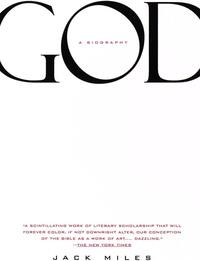On December 13, 2023, the Zahava and Moshael Straus Center for Torah and Western Thought hosted Jack Miles for a virtual talk about his Pulitzer Prize-winning book God: A Biography, which was the focus of a Straus Scholars fall reading group led by Rabbi Dr. Dov Lerner and Dr. Shaina Trapedo.
In conversation with Straus students and faculty, Miles discussed how his engagement with theology, literature, and philosophy enabled him to study the representation of God in the Hebrew Bible through the lens of biography. He then provided an overview of his book’s objective: taking the Hebrew Bible as his primary source, Miles resists reading God as an object of religious reverence, and instead asks, what sort of “protagonist” is God. Can we follow a “life story” from Genesis to Chronicles and carve out a character arc from Tanakh? What depths and complexities might be discovered through this approach, and, more importantly, what might be gained by doing so? What emerges from Miles’ methodology is a heightened awareness of the central character of God, often overlooked amidst the text’s human protagonists, and a keen portrayal of God from Creator to Liberator to Law-Giver to Bystander and beyond in his illuminating and original work.
When asked about his own biography and the early experiences that equipped him for such an undertaking, Miles shared his “initial boyhood ambition of becoming a journalist” and an aptitude for foreign languages that was fostered during his years as a Jesuit seminarian. Miles was sent to study philosophy in Rome where lectures and exams were conducted in Latin, and then encouraged to spend time learning Hebrew in Israel, where “mayim will be mayim, as you have tasted and felt [it] in Eretz Yisrael.” After studying at Hebrew University, where he was during the Six Days War, he received a Ph.D. in Near Eastern Languages from Harvard University.
Miles fondly reflected on supportive scholars who shaped his professional path and personal passion, and encouraged students to seek out advisors who will likewise guide and empower them. Dr. Trapedo took the chance to note that for her, Miles was indeed an impactful mentor during her doctoral work at University of California, Irvine, where Miles served as a Distinguished Professor Emeritus in the School of Humanities. Miles also underscored the importance of cultivating strong writing skills, acknowledging that his early interest in journalism and “instinct to speak to everyone” was invaluable in his effort to reach a wide audience.
Indeed, Miles’ work has been read by lay readers and world leaders alike, including Rabbi Jonathan Sacks, who quotes him in Morality (2020) when drawing a distinction between the culture of ancient Greece and a Judeo-Christian mindset regarding fate versus human freedom:
Toward the end of his God: A Biography, Miles makes a fascinating distinction between Greek and Shakespearean tragedy. In Greek tragedy fate is determined by factors external to the agent, outside his or her control. In Shakespearean tragedy those factors are internal. They form a struggle in the mind of the hero…. As Miles puts it: ‘It is precisely the profound effect of the Bible on European society that explains why Shakespearean tragedy is as unlike Greek tragedy as it is.’ Shame and necessity give rise to a culture of tragedy. Guilt, repentance, and responsibility give rise to one of hope.
Miles expressed his delight in speaking with Yeshiva University students, for whom “Jewish tradition engages Scripture in its plurality and its variety,” and who appreciate “the anthological character of Jewish writing which is ever expanding, like an onion with new layers continually being added.” The Straus Scholars’ semester-long study of his work advanced the Straus Center’s mission of training Yeshiva University students to be Modern Orthodox intellectual leaders who are well versed in Torah and the Western canon.

